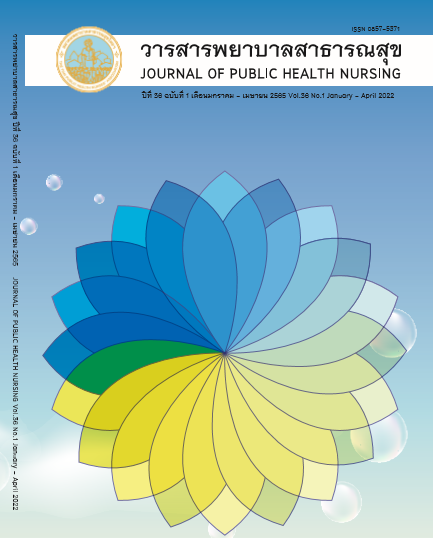Effects of a self-efficacy enhancement program on smoking cessation behaviors of patients at risk of cardiovascular diseases
Keywords:
Smoking cessation, Self-efficacy, Patients with Cardiovascular risksAbstract
Patients at risk of cardiovascular diseases who smoke are at higher risk than non-smoker patients. This 8-week quasi-experimental study aimed to determine the effect of self-efficacy enhancement program on smoking cessation behaviors among patients with diabetes mellitus and hypertension who are unable to abstain from smoking in Mahasarakham Province. The participants were purposively selected and divided into the experimental group (n=24) and the comparison group (n=26). The experimental group received the self-efficacy enhancement program consisting of group education, discussion with a live model, individual counseling, and telephone follow-up, while the comparison group received usual care. Data was collected by the researcher using a questionnaire and exhaled carbon monoxide measurement at the baseline, post-test, and follow-up.
Data were analyzed using t-test and repeated measured ANOVA. It was found that after the intervention, the experimental group had higher perceived self-efficacy and smoking cessation behaviors scores, than that of the comparison group (p-value < 0.05). In addition, the exhaled carbon monoxide in the experimental group was lower than before the intervention (p-value < 0.05). The findings support that the self-efficacy enhancement program can promote smoking cessation behavior and further study should add the booster activities to sustain cessation behaviors.
References
World Heart Federation. Cardiovascular risk factor [internet] 2017 [cite 2018 August 10] Available from https://www.world-heart-federation.org/resources/risk-factors/
Pitayarangsar S, Pankrajang P, Prechawong S. A situation of tobacco control in Thailand 2014. Bangkok: Tobacco Control Research and Knowledge Management Center; 2014.
Ceass T, Parsons CL. Addressing Tobacco Dependence Through a Nurse-driven Tobacco Intervention Protocol. Nurs Clin North Am 2015; 50(4): 725–34.
Clair C, Meigs JB, Rigotti NA. Smoking behavior among US adults with diabetes or Impair fasting glucose. Am J Med 2013; 126(6): 15-8.
Imnamkhao S. Behavioral patterns of smokers at the smoking cessation clinic in Mahasarakham. Journal of Nursing Division 2012; 39(3): 7-20. (in Thai)
Dongpho P, Ua-kit N. Predicting factors of smoking cessation among patients with coronary artery disease a Thammasat university hospital. TMJ 2018; 18(1): 40-50. (in Thai)
Karom N, Prechawong S. Predictors of short-term smoking cessation among patients with chronic disease. Nurs J 2015; 42(1): 1-11. (in Thai)
Rattanapan C, Khiewyoo J, Raiviboo S, Anuri I. The relationship between smoke-free workplaces and success in smoking cessation among patients with chronic disease in Mahasarakham province. J Public Health 2014; 44 (3): 300-12. (in Thai)
Rumkhuan C, Khuwatsamrit K, Panpakdee O. Factors related to smoking cessation behavior among patients after coronary artery bypass graft. Thai J Cardio-Thorac Nurs 2016; 27(2): 2-16. (in Thai)
Sangkeaw R, Hormsin P, Srisuriyawet R. Factors associated with intension to smoking cessation among male people with chronic disease. Cholburi: Master of nursing thesis Burapa University; 2016.
Bandura A. Social Learning Theory. New Jersey: Prentice Hall; 1997.
hdcservice.moph.go.th [Internet]. 2018 [cited 2018 May 20]. Available from: https://hdcservice.moph.go.th
Kurunun K, Manasurakarn J, Thaniwattananon P. The effect of intergrade program of behavior modification with self-efficacy on smoking cessation behaviors and self-efficacy among patients with chronic obstructive pulmonary disease. SCNJ 2018; 5(1): 47-61. (in Thai)
Polit DF, Hungler BP. Nursing research: principles and methods (3th) Philadephia: Lippincott Williams & Wilkins; 1967. p.448.
Ruamsook T, Kalumplakorn S, Rawiworrakul T. The effect of smoking cessation program by applying the protection motivation theory in patients with hypertension. Thai J Nurs 2018; 67(1): 1-10. (in Thai)
Covita. piCO+ Smokerlyzer: operating manual. New Jersey: Haddonfifield; 2011.
Wanauppatum A, Kengganpanich M, Kengganpanich T, Termsirikunchai L. The effect of the stage of change and social support applied to a smoking cessation program among TB patients. Journal of tobacco control (Thailand) 2008; 2(2): 41-55. (in Thai)
Kleepatum P, Benjakul S, Kengganpanich M, Kengganpanich T. Effect of smoking cessation program for smokers at Bangkeaw subdistrict, Muangangthong district, Angthong province. Veridian E-journal, Science and Technology Silpakorn University 2016; 3(4): 30-43. (in Thai)
Prasert P, Prechawong S. Effect of intensive smoking cessation counseling and promoting walking exercise program on quit smoking behavior in chronic ill patients, smoking cessation clinic. Bangkok: Master of Nursing thesis, Chulalongkorn University; 2014.
Yamsri W, Maneesriwongkul W, Panpakdee O. The Effects of a Motivational Interviewing on Smoking Behavior in persons at risk for coronary heart disease. J Pub Health Nurse 2013; 27(3): 41-57. (in Thai)
Downloads
Published
How to Cite
Issue
Section
License
Copyright (c) 2022 Thai Public Health Nurses Association

This work is licensed under a Creative Commons Attribution-NonCommercial-NoDerivatives 4.0 International License.
บทความที่ตีพิมพ์และแผนภูมิรูปภาพถือเป็นลิขสิทธิ์ของวารสารพยาบาลสาธารณสุข (Thai Public Health Nurses Association)







